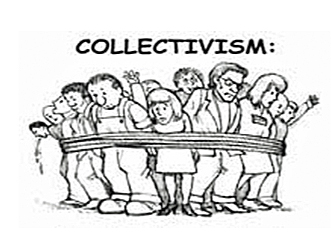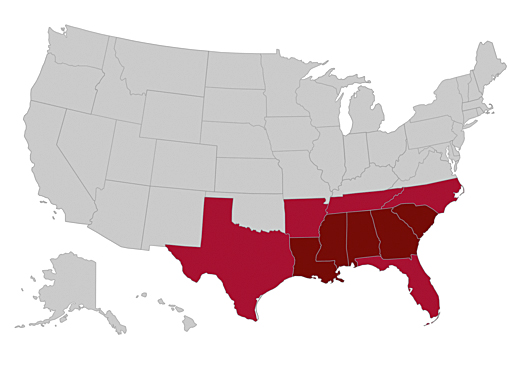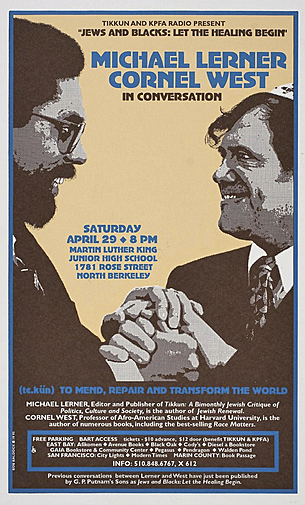
- Articles
Racism and Leftist Solutions as Expressions of Collectivism by Russell L. Blaylock, MD
The liberal left has devoted a great deal of energy in its war on “racism,” a rather hazy concept in modern society. Most think of racism as disliking or even hating someone based only on their race. Almost, as a reflex, one, at least in this country, associates racism with the Southern states — particularly Mississippi. While the Deep South involved itself in the so-called Jim Crow laws and other expressions of segregation policies, it was not alone in racial exclusion policies and social behaviors. One must also keep in mind that such laws were based on collectivism — that is, that a person’s position in society is determined by his race alone — no consideration was to be given to the individual person.
In my studies of the origins of totalitarianism and other dictatorial governments, I have concluded, as have many others, that there are two basic ways of viewing societies — either as collectives or as individuals. The original conservative intellectual views man from a Judeo-Christian viewpoint — that is, that people are special creations of God and each is a separate individual and should be approached and considered from this understanding. Based on this understanding, the conservative should hold each individual, and only the individual, accountable for his or her actions and should extend rights to individuals based on one’s willingness to adhere to the rules of civility and the rule of law. That some conservatives held “racist” ideas and promoted racist social divisions means that they entertained crossed and competing philosophies at the same time — racist collectivism and conservative individualism for whites.

The leftists, on the other hand, see people as collectives and use such terms as crowds and masses to describe collections of individual people. At no time is consideration given to the individual unless they need an example of an oppressed individual to promote their cause. As a result they give a mental “will” to such collective groupings — the so-called “general will” of Rousseau and the mass mind of Marx, Engels, Lenin and the other communist intellectual writers. Likewise, many throughout the world express similar uses of such sociological terms to describe the individual races as a single thinking, reasoning and feeling mass of humanity.
To hate an entire race of people is a collectivist emotion, as one cannot, in truth, hate all individuals within a group of individuals no matter how large. Each person within a racial grouping is an individual — the only real thinking entity. Having grown up in the Deep South, I well remember the days of segregation. Most people I knew, who supported racial separation at the time, had certain “black” friends that they truly liked and/or admired. (The modern leftist denies that any “white” person could truly like or admire a “person of color.”) When these collectivist racists are reminded of this person they often retort — “Oh, Ben is one of the good ones — a real nice fellow.” In most cases they truly mean this because they have judged this person as an individual and not as a collective.

In today’s deeply divided world, we are told the “political right” are all racists and only the left are the friends of the “oppressed’ minorities. The fact that conservatives have sincere and deeply held admiration for black conservative scholars and politicians — such as Walter Williams and Thomas Sowell, Dr. Ben Carson, Herman Cain, and others is beyond leftist comprehension. The leftist pundit or intellectual cannot accept that the “racist” conservative in truth does indeed like a black person close to them and this is because of their collectivist view — that is, all conservatives hate all black people or all Hispanics or other groups. To the collectivist mind, one within an opposing philosophy, the conservative intrinsically must fit the mold proscribed by the leftist elite. One is not allowed to have an individual viewpoint or contradict the collectivist paradigm.
One of the most glaring problems is, as mentioned, the conservative black person — how can the leftist elite (almost always Caucasian) deal with this difficulty? To deal with this contradiction they have created the term “Uncle Tom,” suggesting that these black men are not really black. Such an absurdity allows them to anoint one with their racial classification as they did when they called Bill Clinton America’s first black president. Blackness, just as with being female or poor, is not based on commonly held definitions, but rather one’s association with the leftist philosophy.

Take for example one of the most flagrant contradictions: Feminist extremist of the left made a career of telling us that conservative society feared a woman in a position of power — especially political power. Then, when England voted into power its first female Prime Minister, the silence from the feminist left was deafening. Soon after, this silence was transformed into viscous attacks on Margaret Thatcher and all other conservative or even moderate women elected to positions of political power. Like the previous example, the left redefined what it is to be “female” and conservative females were excluded. We were never told exactly how to classify them, yet they definitely were not females.
This reclassification and anointing of persons with new racial and gender classifications is not limited to these two examples. When the left reverts to using individuals as examples to promote leftist programs they love to describe in great detail how one of their leftist icons rose from poverty to greatness. Yet, when a number of conservative or Christian men and women of great attainment tell their story of early poverty and struggle it is ignored. In essence, the left turns the spigot of sympathy on and off at will, depending on need to pluck the heartstrings of individual voters.
Admiration of black people of distinction as well as of good moral character is common among many people. For example, many middle income and lower income individuals admire their favorite black sports hero, actor, actress or comedian. When asked about this they will invariably say that this person or that is “special” and not like the rest of “them.” This mixes collectivism with individualism. The ones they admire are seen as individuals and the ones they refer to as “them” are seen as a collective. This concept can be applied to any minority — Hispanics, Jews, Christians and others.
The collectivist stereotype ascribed to a group is most often done by members of politically minded elitists, and this can be either favorable or unflattering to the group involved. For example, one can describe the poor as lazy, undisciplined, uneducated and of poor moral character or one can describe them as all pure minded, loving, hard working, moral, family oriented and generous. Neither is the truth — rather one must approach each individual within this economic classification. Some poor people have all of the later characteristics and some the former and many somewhere in between. The same is true with racial groups, gender groups and groups within all other classifications.
Movies play a major role in creating and propagating one’s view of group stereotypes. If a movie is about the plight of poor farmers, abused industrial workers or other social situations the central character sets the stereotype for the group central to the movie and this has a powerful effect on the viewing individual. This is especially so, when the individual viewer rarely interacts with the target group.

People in Mississippi or other Deep South locations are almost always depicted in movies as racist, crude, violent people of low mentality. They marry their cousins or other relatives, never wear shoes, speak with an unintelligible drawl and hold unprogressive views. Yet, the leftist making these movies never see the double standard they operate within. This is because it conforms within their collectivist mindset.
When I was doing one of my last operations before I moved to Mississippi, one of the black scrub nurses, with a look of confusion, asked me why I was moving to Mississippi — after all it was so racist — she exclaimed. She had never even visited the Deep South and knew no one from the area, yet she firmly had this prejudicial viewpoint. This bit of prejudice is widely accepted outside the Deep South and again constitutes a collectivist viewpoint — that is, that all white people in Mississippi hate black people. In fact, the relations between blacks and whites, in my experience since moving to Mississippi, is far better than in the state I left.
In essence, when we are speaking of someone we know personally and like them, we are behaving as individualists in our philosophy and when we make racial judgments we are acting as collectivists. Racial slurs are collectivist terms. While racism deals with various races of mankind, there are similar collectivist created groups in other areas of society — such as the “rich,” the poor, the retarded, the handicapped, the blue collar workers and the white collar workers, etc. In each case, the one being attacked is treated as a collective, as if all poor people are worthless and lazy and all rich are evil and all disabled are completely helpless.
At least in modern times, this psychology was honed during wartime. During the Korean War, the number crunchers found that a large percentage of the shots fired by our troops were over the heads of the enemy. They discovered that the young soldiers, coming from a peaceful society, just could not bring themselves to shoot to death another person. They then launched a psychological program used in many wars — demonize your enemy. The filthy Jap, the barbaric Hun, the evil yellow man, the goose-stepping Germans are good examples. The psychological operation experts realized that when you made the soldier see the enemy as less than a person — that is, less than human — they could then shoot them. But, and this is important during wartime in the minds of the commanders, you had to make the soldiers see all enemy as evil and this required a collectivist mindset.
This is also what the collectivist Nazis and Soviets did as well — they demonized those who rejected collectivism as “enemies of the people.” This has been repeated in subsequent communists states, such as Cuba, Vietnam, Laos, Cambodia and China. To the socialist/communist the vile enemy is the capitalist, which in essence is the individualist. They use the psychological (PSYOPS) method of demonizing the “capitalist” in the minds of the individual targeted by the propaganda.

Leaders of race-baiting “civil rights” groups use this tactic as well. They imply that all white people are evil, racist, and out to destroy the lives of people of color — whatever that term really means. This is explicit in the writings of the Nation of Islam and Louis Farrakhan, who have actually stated that white men are devils. Less explicitly such luminaries — as the preachers Al Sharpton, Jesse Jackson, and most certainly, Jeremiah Wright, and such “intellectuals,” as the leftist professor Cornel West — have all suggested and collectivized all or most white people as racist, all the while claiming to be preaching “reconciliation.” Even when these targets of the civil rights groups have close friends that are black or Hispanic or even are married to blacks or Hispanics, the left claims that the race prejudice is “subliminal” — it is instinctive, according to their analysis, and cannot be overcome. This viewpoint is also collectivist in that it necessarily treats all white people as a collective, a group, as if they share a single mind.
This racial division or division along political lines keep their enemies off balance and it solidifies the targeted group to always support their defenders, that is, there is method to their seeming madness. Many blacks and other minorities are convinced that the “whites” hate them and are out to oppress or destroy them. This keeps them in the collective. The greatest fear of the leftist is that should they actually mingle with the “enemy,” they would soon see that the collectivist propaganda was a lie. This is why periodically, especially when the races seem to be getting along, we see a massive resurgence of collectivist hate mongering by the left. I have witnessed this many times over my lifetime. Unfortunately, it works.
Now, if you honestly ask a black person if they think all black people are warm, kind, generous, moral, hard working or possess the other virtues, most would say, no. Some, they would say, are wonderful people and some at the other extreme are evil, liars, cheats, mean spirited and not one that you would want to have to deal with. The same is true of “white people.” I do not like all white people or honor them and wish to befriend them. I judge them as individuals as most of us do on a personal level.
Ironically, it was Martin Luther King Jr. who expressed it best when he said that we should not judge a person by the color of his or her skin but “by the content of their character.” This necessarily means we should judge them individually — that is, as a person. There are a great number of black people, Hispanics and Jewish people I hold in very high regard and proudly call them friends. I have chosen them based on their character and not the color of their skin or some other artificial division.

It is also instructive to listen to many of the young people, especially those attending universities, as they tell why they voted for Barack Obama. A great number of them have stated proudly that they thought it was time for America to have a “black president.” This is not judging a man by his character — it is judging him by the color of his skin. They knew very little about Obama as a person, his beliefs, his moral character, and his worldview — far less his vision for America. All they wanted to accomplish was to elect the first “black president.” This too is collectivist thinking, as if all black people are stamped out of a single mold. Certainly, conservative “white people” would not vote for a person just because he was “white.” And we see that white conservatives are enthusiastic supporters of a number of black conservatives — e.g., Dr. Ben Carson, Thomas Sowell, and Walter Williams, among others. In other words, to the conservative all that matters is the “content of the writer or the candidate’s character.” We recognize the individual and not just the racial grouping.
The same collectivist mentality can be found within the leftist solutions to the “racial” problems of this country. First, the laws that have been passed beginning with the Civil Rights Acts of 1964 and since, treat minorities as a collective. Now I understand that when designing such laws one must make these laws universal, but when the bureaucracy intervenes with its massive set of imposed non-legislative rules, each having the force of law, to apply the same collectivist principle described, it is destructive of society.
Take, for example, rules governing set asides and racial quotas, something specifically prohibited by the original civil rights legislation. Here the collectivist philosophy becomes particularly onerous because it takes away one’s right to make individual judgments, one based on race rather than individual character. Lets say a minority person is chronically late for work, does shoddy work and is disruptive within the place of business. Under present bureaucratic rules (laws) it is extremely difficult and expensive for an employer to fire this person if they are a minority. To the collectivist, all minorities are from a single ideological mold and this implies that the only reason one would want to fire them is to deprive them of their newly discovered rights.
Likewise, when racial quotas are set and a particular employer is unable to find qualified minority workers, he must still fill this quota by hiring less qualified workers, even though non-minority, highly qualified workers may be available, they must be overlooked. Again, this assumes that the chosen minority is a representative of the idealized minority in the mind of the collectivist rule maker. The individual person cannot be evaluated as an individual; he or she must be treated as a representative of the collective — that is, an idealized person, who in truth does not exist.
The Judeo-Christian idea that each person is a special creation of God and therefore answerable for his/her individual behavior is, and has always been, an anathema to the collectivist. To the collectivist, people are members of a group and this group, in their way of thinking, has a collective mind, a collective personality and individual differences are not recognized. To do so, would bring down the collectivist illusion, which is the foundation of this political viewpoint — that is, that individuals do not exist in the body politic or in society.
Richard Weaver notes, in many of his writings, that most of us have been infected by the collectivist mindset when we say such things as — “society concludes,” “blacks feel” or “people decided.” F.A. Hayek and Ludwig von Mises have written extensively on the collectivist philosophy and why it harms individuals, especially those who are the supposed recipients of collectivist benevolence. If a minority individual cannot be recognized for his creativity, his industry, his dedication to moral principle, his discipline, and his loyalty to family and friends, what chance does he have when treated merely as part of a collective? In essence, his individuality is taken from him and he becomes an illusion — he is forced to assume the role of a faceless, soulless and helpless member of a collective that he neither created nor wanted to participate in. His choices as an individual are taken from him by force. How can this be compassion? Where is the fairness in such a philosophy? Once a man becomes merely a member of such a collective, he ceases to exist.
Written by Russell L. Blaylock, MD
Dr. Russell L. Blaylock is President of Advanced Nutritional Concepts and Theoretical Neurosciences Research, LLC, in Jackson, Mississippi. He has written numerous path-blazing scientific papers and many books, including Excitotoxins: The Taste That Kills (1994), Bioterrorism: How You Can Survive (2001), Health and Nutrition Secrets (2002), and Natural Strategies for Cancer Patients (2003). He is Associate Editor-in-Chief and a Consulting Editor in Basic Neuroscience for Surgical Neurology International (SNI). His websites are: www.blaylockwellnesscenter.com and www.russellblaylockmd.com.
This article may be cited as: Blaylock RL. Racism and Leftist Solutions as Expressions of Collectivism. HaciendaPublishing.com, June 16, 2014. Available from: https://haciendapublishing.com/racism-and-leftist-solutions-as-expressions-of-collectivism-by-russell-l-blaylock-md/.
Copyright ©2014 Russell L. Blaylock, M.D.